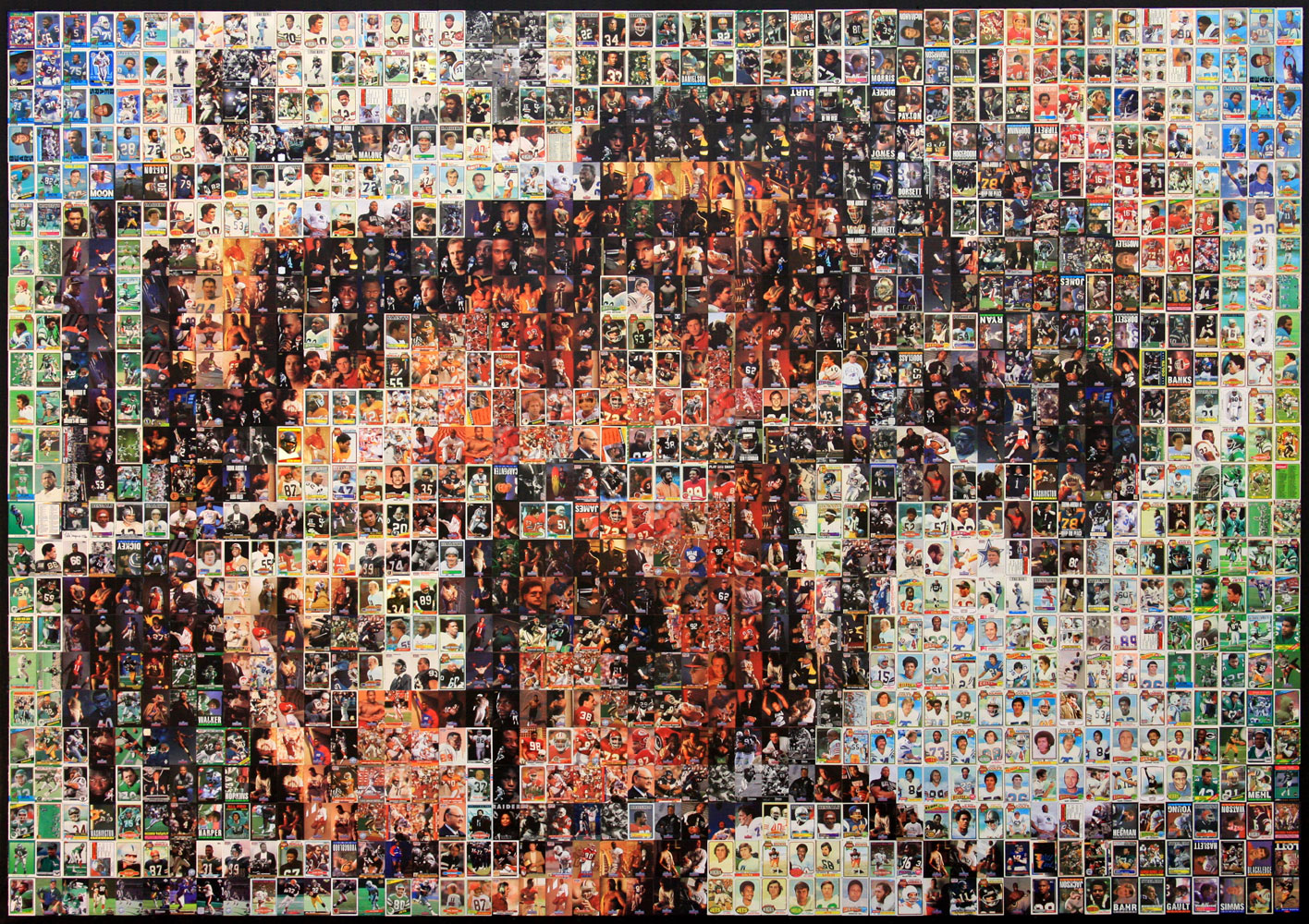This is a portrait of Walter Payton (entitled "Sweetness"), a running back for the Chicago Bears from 1975-1987. It is made of 1,152 old football cards, and measures 7 feet tall by 10 feet wide. It follows my typical portrait style of constructing the subject’s image using a medium directly related to his life. There are many Walter Payton cards in this portrait. In fact, there is at least one for every year he played; starting with his 1976 Topps rookie card, and continuing up until his 1988 Topps record breaker. Part of the fun is trying to locate them in the piece. There is also some other hidden meaphors in the piece. At one point, I have placed a card of Walter Payton directly next to a card of his brother Eddie Payton. This shows the conflict they must have experienced when the Bears played the Vikings, in which they were family in real life, yet supposed rivals on the field. I did that to echo my own personal struggle of being a Minnesota artist, yet honoring a player of a rival team by doing a portrait of him. Also, in the bottom right hand corner, there is a card of a player named "Wayne Hawkins". He was drafted by the Patriots in 1992 from Southwest Minnesota State University in Marshall MN. This is the same college I attended for a degree in studio art. I signed my name on his card to symbolize our connection of attending the same university.
Anyone who knows football, knows the name Walter Payton. I have many objections to the current state of professional sports (mostly with the media influence, the athletes behavior, and the millions of taxpayer dollars wasted just so the game can happen), but as a boy growing up I had an intense love for the sport, and collected football cards in an attempt to have something related to the athletes that I admired. Most of the cards in this portrait are from my childhood collection, the others I got from friends/family, or picked up at local card shops. I used to love playing football after school with my friends, escaping from my life of homework and chores, pretending to be those famous men I saw on the television every weekend. That lasted until I was about 11 or 12 years old, and realized how foolish it was to put athletes up on a pedestal.
Besides a few exceptions, most of today’s athletes are idiots. The vast majority are uneducated, because they were drafted straight out of high school or their grades/class schedules were fixed to avoid academic probation. Because of this, they have nothing to fall back on after they retire from their short careers (other than broadcasting or coaching), and end up going bankrupt very quickly. Also, many of them are hooligans and thugs with criminal records due to their stereotypical, ridiculous behavior. They are in the public eye, and have a huge influence over our nation’s youth…it's time to get their act together and accept responsibility for who they are and the impact they possess. They can say it’s the media’s fault for putting them in the spotlight, and I agree; however they knew that they would be put in the spotlight when they chose this career, so it’s just as much their fault for having this knowledge and still acting the way they do. This is the main reason I chose Walter Payton for this portrait…because of the man that he was both on and off of the field. Walter Payton was truly a role model. He knew he was in the public eye, admired by thousands of people, and had a tremendous amount of influence over each one. He was respectful of both the other players and the fans, and had very professional conduct whether he won or lost. After he retired from football, he even planned for his family’s financial well being by starting what became known as “Walter Payton’s Roadhouse”, which hosted a restaurant, brewery, banquet hall, and museum. It was very successful and won many awards by the city of Chicago. This is different than most professional athletes, as an overwhelming percentage of them end up filing for bankruptcy very shortly after their careers are over, and the money stops coming in.
After being diagnosed with terminal liver disease in 1999, he spent the remaining months of life writing an autobiography entitled “Never Die Easy”. He also started the still active Walter & Connie Payton Foundation, which is a leader in creating awareness for organ donations. The foundation also established the Walter Payton Cancer Fund in 2002. Walter Payton was a great athlete, a true role model, and an exceptional human being. He was a legend both on and off of the field, and has left a legacy that will out-live the sport we remember him for. He deserves every second of the immortality our culture has given him.



